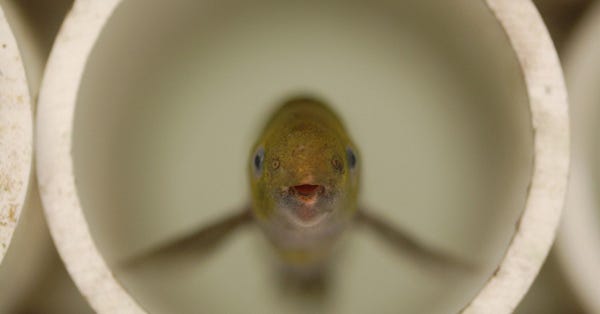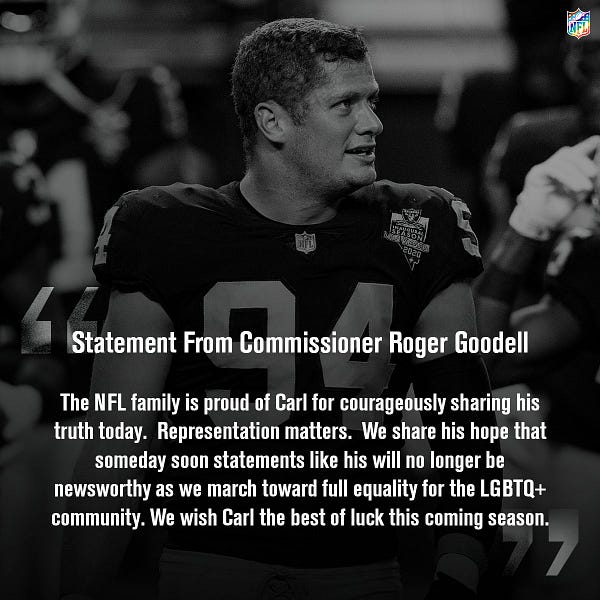Out of Scope Issue 21: Pause for Dramatic Effect
This week’s non-required thinking on reputation, business, and culture
This week, we’re looking at petitions for Jeff Bezos, examining pop culture narratives across sports, music, and TV, and virtually high-fiving HBO for a social response gone right.
📡 ON OUR RADAR
Joel Castón understands the power of a narrative. As the first incarcerated person ever elected to DC public office, Castón says that his mission is to change public perception of incarcerated people and be a “voice for the voiceless.”
Change.org online petitions advocating to leave Jeff Bezos in space and for Jeff Bezos to buy and eat the Mona Lisa have over 130k cumulative signatures, forcing the Louvre to acknowledge the petition (albeit with “no comment”). The cheeky viral petitions demonstrate once more the impressive reach that random internet content can garner.
Times Square is back — scary Elmos, ads, and all. Revenues from out-of-home advertising fell 45% year over year in Q2 last year, but one digital billboard owner says revenues for the busiest and brightest spot in NYC have increased 2x year over year annually between 2018 and 2021.
Nearly six months after the Clubhouse’s popularity boom, Facebook has officially launched its rival live audio rooms. But does anyone actually care? Facebook is hopping on the bandwagon relatively late after Twitter and Spotify, and LinkedIn plans to follow suit. One of the main appeals of Clubhouse was its exclusivity, through its “invite-only” access and frequent celebrity cameos. But with Clubhouse announcing it will soon be open to all and the choice overload, will the hype around live audio withstand?
The N.C.A.A needs to take a second look at who its most powerful stakeholders are, regroup on a comms strategy, and get back to us. This week’s Supreme Court ruling was a small win for student-athletes, who have long been generating massive revenue for college institutions without being compensated. For its part, the N.C.A.A argued that compensating student-athletes would undercut their amateur status, which...did not go over well given their business model. Time to pivot your messaging, folks!
Reality TV has always been the clickbait of TV, but has it gone too far? This week, Netflix released the trailer for "Sexy Beasts”, a new dating show where people prep for blind dates by donning animalistic prosthetics. Based on the audience reaction, Netflix has already won the buzz game - it seems that many will be tuning in for a “hate-watch” out of morbid interest.
Don't be afraid to lean into a pun… it might just get major media traction! This NY Times headline plays on everyone’s favorite Dean Martin song, That’s Amore. Try thinking of eels ever again without this earworm of a tune in your head!
Meme-aw has something to say about outbursts on planes! Stories about passengers harassing flight attendants used to make waves, but with the rise in attacks due to nervousness around the pandemic and anti-mask sentiments, attacks like these are a dime a dozen. It’s an issue that needs rectifying, but are memes really the right way to start the conversation?


Even the fish know about the power of the pause for dramatic effect!


Speaking of absence speaking volumes… David Keene, former NRA President, was invited to speak at a high school graduation that wasn’t quite what it appeared. Thinking it was a rehearsal, Keene spoke to a field of empty chairs, highlighting the importance of the second amendment. Unbeknownst to Keene, the graduation was in honor of all the students who should have graduated in 2021 but were killed by gun violence, leaving him speaking to 3,044 empty chairs.
Have you heard of “main character energy?” Think of the feeling you get when you’re staring out into the sunset and your favorite song comes on - that almost cinematic moment of being the center of attention, if only in your personal world. But according to the New Yorker, some people are taking “main character energy” to the next level with made-for-audience-consumption content on social media. In a world where every moment can be broadcast online, are we all now the main characters of our social feeds?
NYC held its primary elections this week, with the race for mayor taking center stage. Arguably the most well-known name going into the race, Andrew Yang has conceded, leaving many to wonder why he received so much media attention. Was the Yang Gang all hype, no substance? His own consultant apparently called him an “empty vessel” due to his lack of ideological consistency, and with viral moments where he fumbled over issues surrounding Israel-Palestine, homelessness and mental illness, and the LGBTQ community, his strategy of running on speech began to fail.
🏆 REPUTATION WIN/FAIL OF THE WEEK: HBO’s INTERN
Last week, HBO Max sent its subscribers an empty email that was clearly an error, titled “Integration Test Email #1” with no context. The company later explained the mysterious email with a tweet that gently attributed the huge mistake to an intern, writing, “We mistakenly sent out an empty test email to a portion of our HBO Max mailing list this evening. We apologize for the inconvenience, and as the jokes pile in, yes, it was the intern. No, really. And we’re helping them through it. ♥️ ”
HBO’s response was ultimately praised for tactfully acknowledging the incident while also demonstrating grace towards the intern’s mistake. The situation was relatable for people who began sharing their own stories and jokes about internship or early-career mishaps, and many seemed determined to support and cheer up the presumably distraught intern. In a time when fair employee treatment is viewed as a critical component of corporate responsibility, we think HBO’s crisis communications strategy was spot on.
💡ON OUR MINDS
“Free Britney” and the question of who controls a story 📣
This week, Britney Spears made her case in court to end the conservatorship that she’s been stuck in for the past 13 years. Under the conservatorship, which came into effect after a paparazzi-fueled mental health breakdown, Britney’s father has the singular decision-making power to control every aspect of Britney’s life and finances.
Conservatorships have gotten a bigger spotlight in the media as of late, with a recent NYT Presents special on Hulu focused on “Framing Britney Spears” and a Netflix movie, “I Care A Lot” where Rosamund Pike depicts a nefarious legal guardian who’s only in it for the money.
Britney’s impassioned speech has brought the issue back to the surface, sharing that under the conservatorship she has been drugged, forced to use birth control, and strong-armed into performing on stage without her consent.
Disability rights advocates are using the #FreeBritney momentum to argue for more awareness around the issue of conservatorships. If the world’s most famous pop star has struggled to regain control of her life, how hard is it for those with less power?
The late 90s/early 2000s storytelling around Britney’s rise and fall to fame painted a damning picture of the pop star’s ability to care for herself, but the power dynamic between who controls Britney’s story and whose version of the story is granted credibility is a tragic reminder that it’s important to understand how a story develops, whose perspective it’s coming from, and what’s not being told.
A history-making NFL moment 🏳️🌈 🏈
This week, Raiders defensive lineman Carl Nassib came out as gay, making him the first active NFL player to do so.
The communications approach was coordinated between all of the major players - the NFL backed Nassib with supportive social posts galore, teams throughout the league issued their own congratulations and messages of support, and Nassib had a $100K donation ready for The Trevor Project along with his official statement.
It’s almost astounding to see this major first for the NFL in 2021, but with the league’s conservative-leaning fanbase, it’s not entirely unexpected to see this delay.
Michael Sam was the first openly gay man to get drafted into the NFL back in 2014, but was cut from the Rams before playing - what some attributed to homophobia, while others said it was more nuanced than that.
Can the Bachelor franchise rose to the challenge? 🌹
The first Black Bachelorette Rachel Lindsay’s tell-all about her experience with the Bachelor Franchise reveals the danger of creating a comms machine that can’t adapt to nuance.
Throughout The Bachelor franchise (and on reality TV in general), storytelling has long relied on stereotypes to hook audiences while avoiding complex conversations around gender, love, sexuality, beauty, or race that dictate the lived human experience of its contestants.
For many reality TV viewers, their time with the show is an escape, not one where they’re looking for complexity and hard truths. While attempting to attract new demographics of viewers to Bachelor Nation with Rachel Lindsay as the star, the franchise also sought to appease its more established fanbase, leaning into orchestrated moments of drama like an encounter with a racist suitor rather than engaging the audience with nuanced discussion.
ABC and the Bachelor franchise, like many companies, face increasing demands for more inclusive and authentic representation, but thus far have struggled to strike the right balance of escapist television viewing and diversification. Long-time host Chris Harrison departed the franchise earlier this year when he defended “Bachelor” winner Rachael Kirkconnell, whose former plantation party photos re-surfaced on social media.
The Bachelor franchise’s formulaic approach to storytelling may have engaged some viewers, but thus far has alienated others (and its contestants), and hasn’t yet succeeded in toeing the line with both audiences. Brands can learn from Rachel’s story — buzzwords, stereotypes, and surface-level changes can’t stand in for a meaningful, relevant brand narrative around diversity.
We’ll see you here next week! 👋
HL
===
The fine print:
This newsletter brought to you by the SparkNotes Instagram account. Happy Friday, Old Sports.




